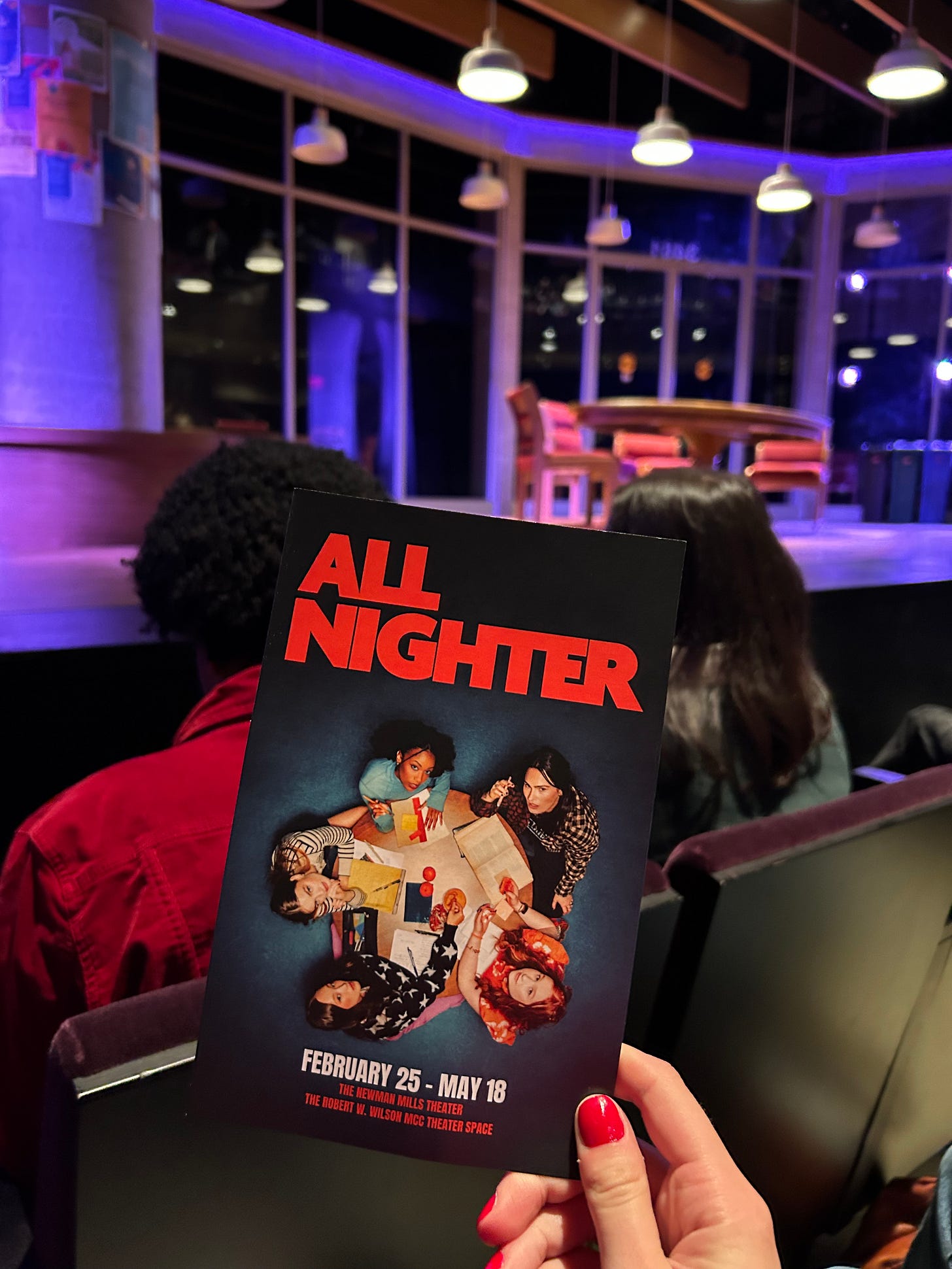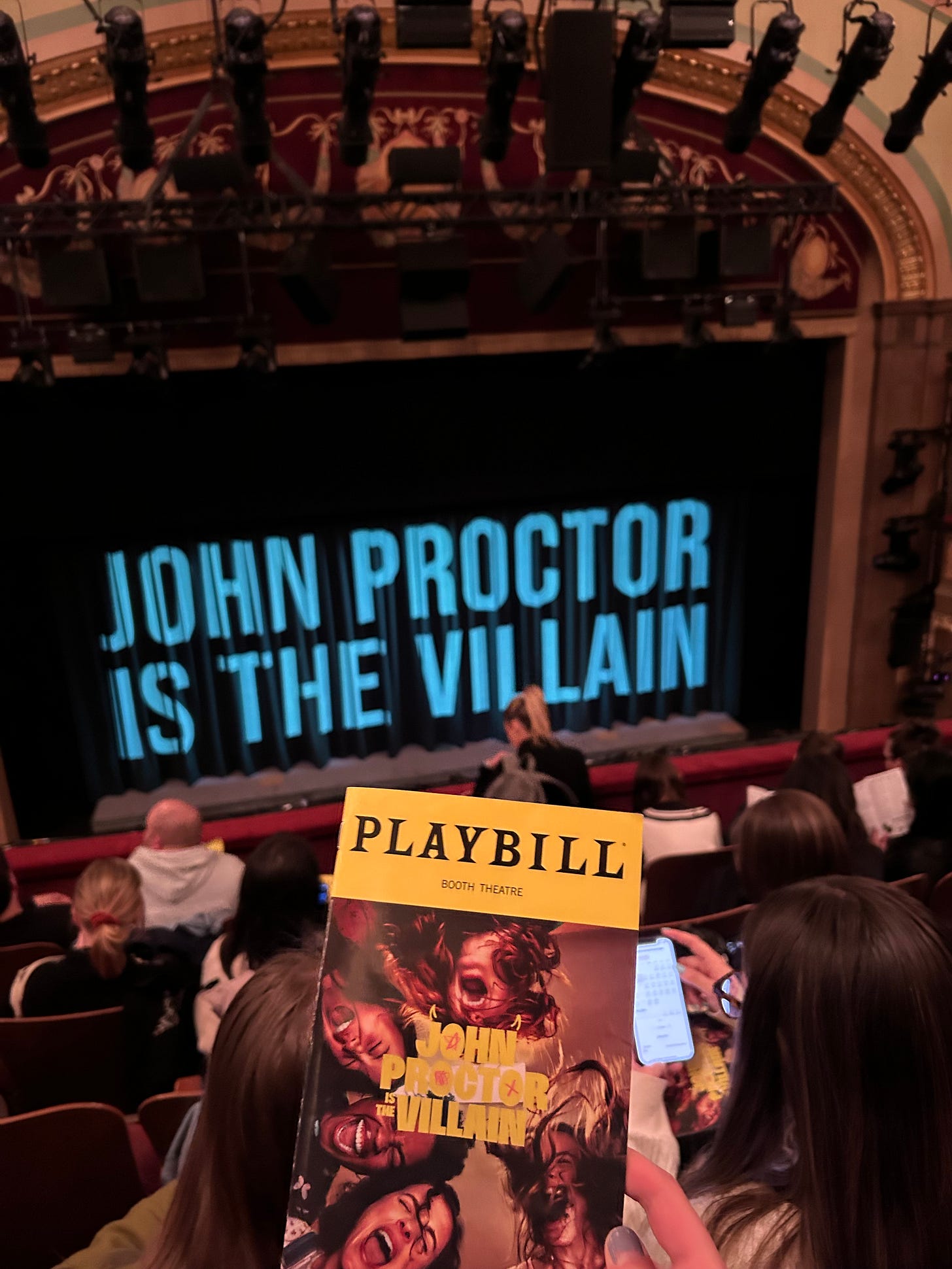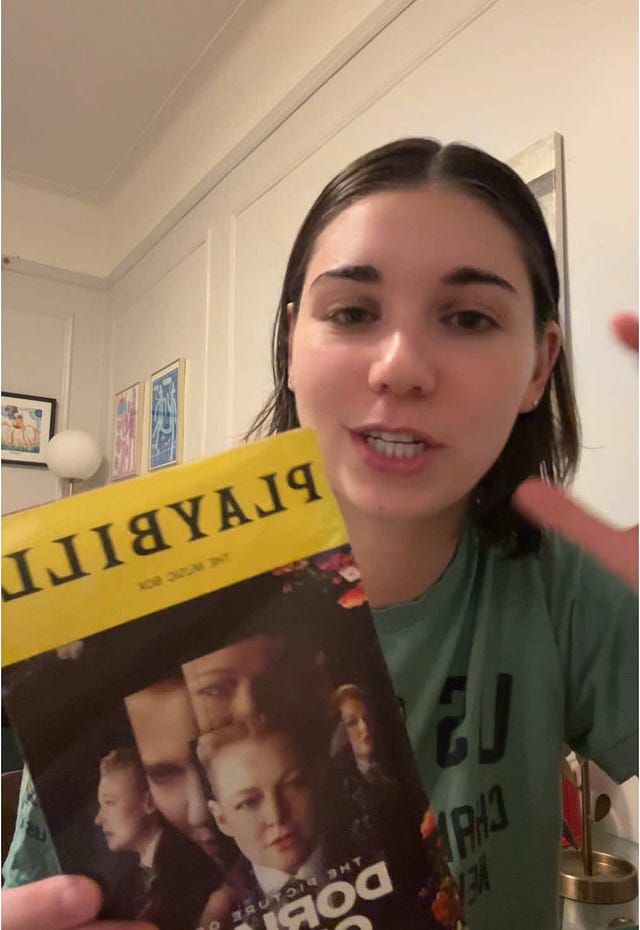Supporting Women's Rights and Wrongs: Female Friendship in 'All Nighter' and 'John Proctor is the Villain'
Cue Lorde's "Green Light."
This theater season is for the girls. Specifically, this spring has brought shows that not only feature girls on stage, but are getting girls to the theater in droves.
“All Nighter” and “John Proctor is the Villain,” off-Broadway and on Broadway, respectively, are thrilling, delighting, and intriguing the girls of New York City. But what makes these shows special isn’t just that there are girls represented on stage. Instead, what I found most compelling about these shows is how they’re representing the relationships between girls—not sweet, simple, glorified female friendship, but the beauty and turmoil of high school and college friendships.
“All Nighter” shows female friendship in a pressure cooker: the last all-nighter of a tight-knit group of friends about to graduate college. This is a group of girls that has been closely tied together for the last four years, to the point where they know the nitty-gritty details of each other’s everyday lives. In an early scene between two of the girls, they report their hour-by-hour schedule of the day, despite having spent the night before together. When one of them mentions that she made her own pizza, the other gasps loudly. “That is SO productive,” she says, nearly salivating at her friend’s accomplishment. As the other girls come to meet them in the study hall, she repeats the story, and the other girls all have the same reaction. SO productive.
It’s moments like these that illustrate a very familiar, warm closeness that comes with college friendships between girls. When you live on a walkable campus where you see your friends multiple times a day, live with them, and overlap so many parts of your lives, there’s almost an interdependence, a knowing of all of their idiosyncrasies. They’re the people that you text the silly little things to, like about your daily oatmeal tasting weird today or getting a blister on your foot.
It’s a treasure to be known in this way, to have friends that not only care about these things but also are so invested in knowing them.
Where “All Nighter” succeeds is testing the boundaries of this type of care, this type of support. When things inevitably heat up as the night goes on and information is revealed about one of the girls, it should be an irrevocable fracture. But as some of the girls turn, one desperately clings on. “She’s our friend,” she whines, as if the word itself excuses the damaging behavior.
Natalie Margolin successfully pokes holes in the hyper-validation, hyper-support culture of female friendship—supporting women’s rights and wrongs, as one of my favorite memes says. We’re not just women supporting other women. We’re supporting women even if they’re not perfect, well-manicured human beings! We’re supporting messy women. We’re supporting our friends even if they make a mistake.
 Tiktok failed to load.
Tiktok failed to load.Enable 3rd party cookies or use another browser
But how far should that support go? Margolin’s characters may not be the most fleshed out, nor are they given enough time for their bonds to break (or not break). But they do come up against the limit of closeness. Where is the boundary of care, of being a good friend? How much do these girls lose themselves, their morals, in supporting others?
While “All Nighter” explores friendships at their breaking point, “John Proctor is the Villain” comes from the opposite side of this journey: friendships are fraught at the beginning, and it’s a question of whether the girls will come back together. Set in a one-stoplight town in Georgia, this play follows a group of high school girls as they study “The Crucible.”
We’re dropped into an adorably high school friend group. There’s the imbalance of some girls being more mature than others, the awkwardness and giddiness they feel about their feminism club (Fina Strazza, who was just nominated for a Tony, encapsulates that energy impeccably—a bundle of excitement, then embarrassedly reeling herself back in). Yet this group has already been broken by Shelby, their former friend who hooked up with Raelynn’s boyfriend, who’s now on an extended absence from school. Even the sound of her name makes them go cold.
When Shelby (Sadie Sink) inevitably enters the play, back from her absence, I was itching to figure out why she’d been gone for so long—but I was most moved by how the girls reacted. Even as we do find out why, the heart of the show’s emotions lies in how the girls’ relationships do and don’t come back together.
One of my favorite moments is between Shelby and Raelynn (Amalia Yoo), discussing everything that’s happened, confronting Shelby’s behavior and absence. They both don’t have a full grasp on what they're feeling or who they are, but they know they can tell each other anything, even the fucked-up things that they’re scared to feel. When the worst comes out, there’s not long, meaningful dissection. It’s not a therapy session. Instead, it’s high school girls doing what they can—acknowledging it, then making a silly joke that makes them laugh for minutes, minutes that make the audience feel awkward, minutes that let us know everything is not OK, but is going to be.
The beauty of “John Proctor is the Villain” is how it gives power to these high school girls, who have been told they don’t know anything, who have been told the way they see the world and their interpretations of “The Crucible” are incorrect. In the face of authority, of a world who is trying to control them, they find and hold onto each other. It’s a beautiful thing to see girls accept one another, even before they’ve grown up and know who they are, and to feel like they’re together for the journey.
“All Nighter” and “John Proctor is the Villain” are not the only plays about girls and their friends to exist, and I hope there are a lot more to come. But for now, it’s rare to see these relationships—as messy and confusing and beautiful as they are—at the heart of a story on stage. And it’s rare to be in a theater full of girls my age, to collectively gasp and giggle and smile in recognition. It made sitting in the audience feel more like a community. And it made the train rides home with my friends—the girlies—just a bit more special.
How to See ‘All Nighter’ and ‘John Proctor is the Villain’
If you love plays about girls, first read Emily’s smart, creative piece in The Brooklyn Rail—which also talks about these two plays, as well as some other recent girl-focused shows. It’s the girl play era!
Next, here’s how I saw/how you can see these shows.
“All Nighter” has a limited Off-Broadway run at MCC Theater, ending later this month on May 18.
How I found out about it: Instagram! This one has been all over my social media because I follow Ben Platt, who produced it, then followed the show’s account on Instagram—which has honestly been really clever and on-trend.
Why I went: This might be the first cast where I have fully recognized and watched every cast member in something they’d worked on, which was really exciting. It also felt hyper-relevant as a girl from a small liberal arts college.
How I got tickets/how you can get tickets: Regular price (can you believe it)! There are tons of tickets around $50 for this show available. I’ve also seen it on TDF for $40 on multiple occasions.
“John Proctor is the Villain” just got a slew of Tony nominations (!!!), including Best Play, Best Leading Actress (Sadie Sink) and Best Featured Actress (Fina Strazza). Bring the girls, but also bring the boys who need to see plays about girls.
How I found out about it: I think first from Emily, who is always on the pulse of great new theater and plays for the girls (see above).
Why I went: I can’t repeat this enough: for the girls.
How I got tickets/how you can get tickets: Previews pricing! The show had special $50 tickets. There are online lottery tickets for $45, and digital and in-person rush tickets for $40. Full-price tickets start at $67, but I expect them to keep creeping up as we’re in Tonys season!
Other Theater I’ve Seen...
Old Friends
My friend Sara said it best: “Old Friends” is like the Sondheim Eras Tour. Led by icons Bernadette Peters and Lea Salonga, this revue is a beautiful journey through some of Sondheim’s greatest hits, from Bernadette (as she’s credited in the program, first-name only) as Little Red in “Into the Woods” to Lea as Mrs. Lovett in “Sweeney Todd.” While the leading women lead a hell of a show, the ensemble also shines; I especially loved Beth Leavel’s angry “Ladies Who Lunch” and a sweet “Tonight Quintet.” This doesn’t need anything splashy to make it fun or pointed to make it emotional. Sondheim’s music, no matter what way you cut it and with these stars, sings for itself.
This runs until mid-June and if you’re under 35, you can still get $30 tickets with the code SSOF3U3 here.
What’s Next
Reviews for “Floyd Collins” and “Real Women Have Curves” incoming! If you’re too impatient to hear, check out my new endeavor—posting my theater thoughts and so-so theater jokes on TikTok.
I’m also rounding out some of my busiest theater weeks with “Operation Mincemeat” and “Dead Outlaw” this week, which will put me at 5/5 on all the Best Musical and Best Play Tony nominees. These have both gotten a ton of buzz—I’m really excited. Stay tuned for thoughts.
And as always, thanks for reading!








